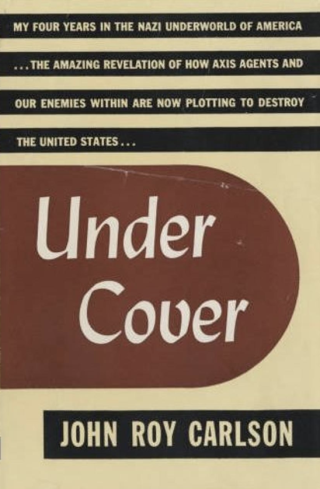In 1943, Arthur Derounian, under the pen name John Roy Carlson, published the groundbreaking bestseller Under Cover: My Four Years in the Nazi Underworld of America, exposing the influence of right-wing extremist groups during World War II. New York Times book critic Orville Prescott deemed his “undercover detective work” “one of the most important individual contributions made by any American writer” to the survival of democracy. Derounian disappeared from the public’s consciousness by the 1950s. Yet, reading his work today feels like a Hollywood prequel script recounting a villain’s origin story.
The Armenian American journalist began writing about right-wing extremists for Fortune magazine just weeks after he found an antisemitic pamphlet in the New York subway in 1939. Despite being married with a newborn on the way, Derounian found the first event that he attended—a German American Bund rally at Madison Square Garden—“so alarming […] that it plunged [him] into a career as an investigator of Nazi activity.”
Derounian poured himself into his role. He moved to Little Italy to make his alias, George Pagnanelli, more authentic. Despite being terrified of guns, he enrolled in shooting lessons to prepare for the military drills overseen by the Phalanx, the “shock troops” seeking a “‘Christian’ [form of] government.” To ingratiate himself with local organizers, he helped with mundane tasks like folding flyers and picking up pamphlets before starting his own far-right publication, The Christian Defender. “The cruder it got,” he observed, “the more it slandered the Jew and assailed Democracy, the more popular it became.”
Derounian’s immigrant heritage had instilled in him a sensitivity to ethnic and religious hatred. Born in 1909 in the western outskirts of the Ottoman Empire, he moved with his family to Long Island in 1921 in the aftermath of the Armenian genocide. The 1933 assassination of Archbishop Levon Tourian marked the other defining moment of his life. Derounian stood by helplessly during a Christmas Eve mass in Manhattan as nine men from an Armenian faction surrounded the archbishop and stabbed him to death with double-edged butcher knives.
The murder not only set him upon a career as a muckraker, but it also called into question his faith in the United States as a safe haven from the “perverted nationalism” plaguing many parts of the world. Finding it difficult “to conceive that this frightful murder had occurred,” he saw his undercover work as an opportunity to help vanquish the forces “intent upon destroying every vestige of freedom in America.”
